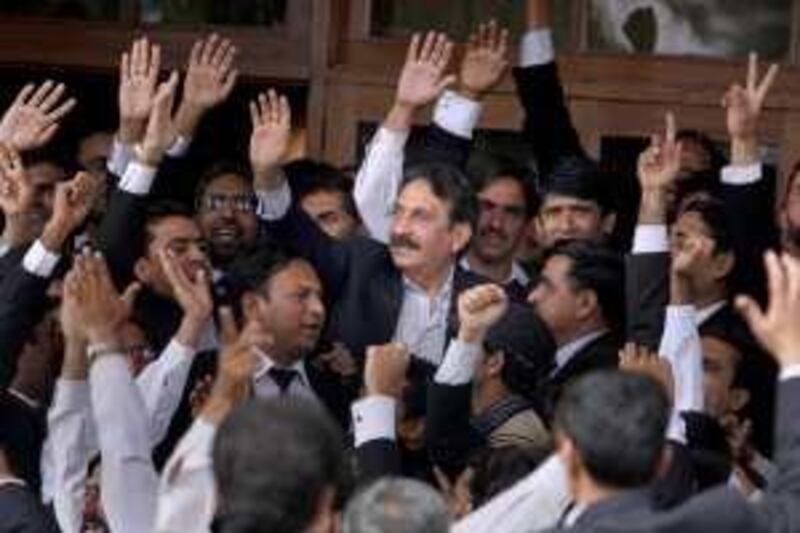ISLAMABAD // In a country where rulers rarely concede issues but instead opt for confrontation - even if it means having their governments overthrown by the military - Asif Ali Zardari's latest move was generously construed by some politicians as an "act of political maturity".
When the Pakistani president yesterday agreed to restore the country's chief justice, Iftikhar Mohammed Chaudhry, who was sacked two years ago by the former military ruler, Pervez Musharraf, he signalled a historic victory for the country's lawyers' movement. One protester's placard seemed to sum up the feelings of the moment in the capital: "We fought for justice and survived." The scale of the victory was also written on the faces of the lawyers who had gathered outside Mr Chaudhry's house after travelling to Islamabad from Lahore.
Mohammed Ajmal, a lawyer from Lahore who had been imprisoned for 10 days at the start of the protests, said: "This is the rule of law. We have defeated two dictators - one civilian and one military. We are not political; we have won a victory to save Pakistan." "It is too good. We have been suffering for three to four days, but now we have had a great result," said Nawaz Olukh, a PML-N party official from Sindh.
Mr Olukh predicted the return to power in Punjab province of Shahbaz Sharif, its former governor, and his brother, Nawaz Sharif, a former prime minister and political rival to Mr Zardari. A court ruling last month barring them from running for political office in Punjab precipitated the current crisis. Opposition leaders and lawyers had vowed to hold a sit-in at the parliament today until Mr Chaudhry, known for his independence and willingness to challenge authority, was reinstated.
"This is a victory for the people of this country," the lawyers' movement leader, Baz Mohammad Kakar, told reporters. "Chaudhry is the first chief justice in the history of Pakistan who has proved himself to be a judge for the people, as a chief justice for the people." Before being elected president, Mr Zardari had pledged to reinstate Mr Chaudhry within 30 days of taking office, but he reneged on the promise, apparently fearing the justice might re-examine a deal that he and his wife, the slain former prime minister Benazir Bhutto, had struck with Gen Musharraf to grant the pair immunity from prosecution over alleged corruption cases. Before the judges' reinstatement, Mr Zardari had ordered the capital barricaded. Scores of extra police were brought in amid fears of violence.
At midnight the all-powerful army chief, Ashfaq Kiyani, met Mr Zardari and persuaded him to restore the chief justice to office. Gen Kiyani had met Mr Zardari and Yousaf Raza Gilani, the prime minister, earlier in the week, but western diplomats and sources close to the military said it took until early yesterday before Gen Kiyani's "loud and clear" message got through to Mr Zardari that the upheaval was "out of control".
The president was told he had greatly underestimated the numbers of protesters marching on the capital. The army was uneasy about a mass of an estimated 100,000 passing through Rawalpindi, home to the army's headquarters. After 1am the news broke that the prime minister would be making an announcement soon. However, the televised broadcast was repeatedly delayed as the two main parties went back and forth over the details of the agreement before it was finalised.
Pakistanis stayed awake until 6am to hear that after two years of protests the chief justice had been restored. In a dawn address to the nation, Mr Gilani announced Mr Chaudhry would be sworn in on Saturday, the day the current chief justice was set to retire. "I think the time has come to fulfil this promise, so I have advised the president and he has agreed to reinstate chief justice Iftikhar Chaudhry from March 21," Mr Gilani said.
The speech triggered scenes of jubilation outside Mr Chaudhry's home. Mr Gilani also ordered all lawyers and political activists who were arrested over the past week to be freed immediately. The US special envoy to Pakistan, Richard Holbrooke, said the United States applauded "the statesmanlike act by President Zardari and hope that it will help defuse a dangerous confrontation so that Pakistan, with the help of its many friends, can address the nation's pressing and urgent needs".
Senior US and British diplomats had met all parties in recent days to work out a compromise, out of concern that more political upheaval would distract the country's leadership from confronting a growing campaign of violence by elements linked to al Qa'eda and the Taliban. iwilkinson@thenational.ae * With additional reporting by Associated Press





